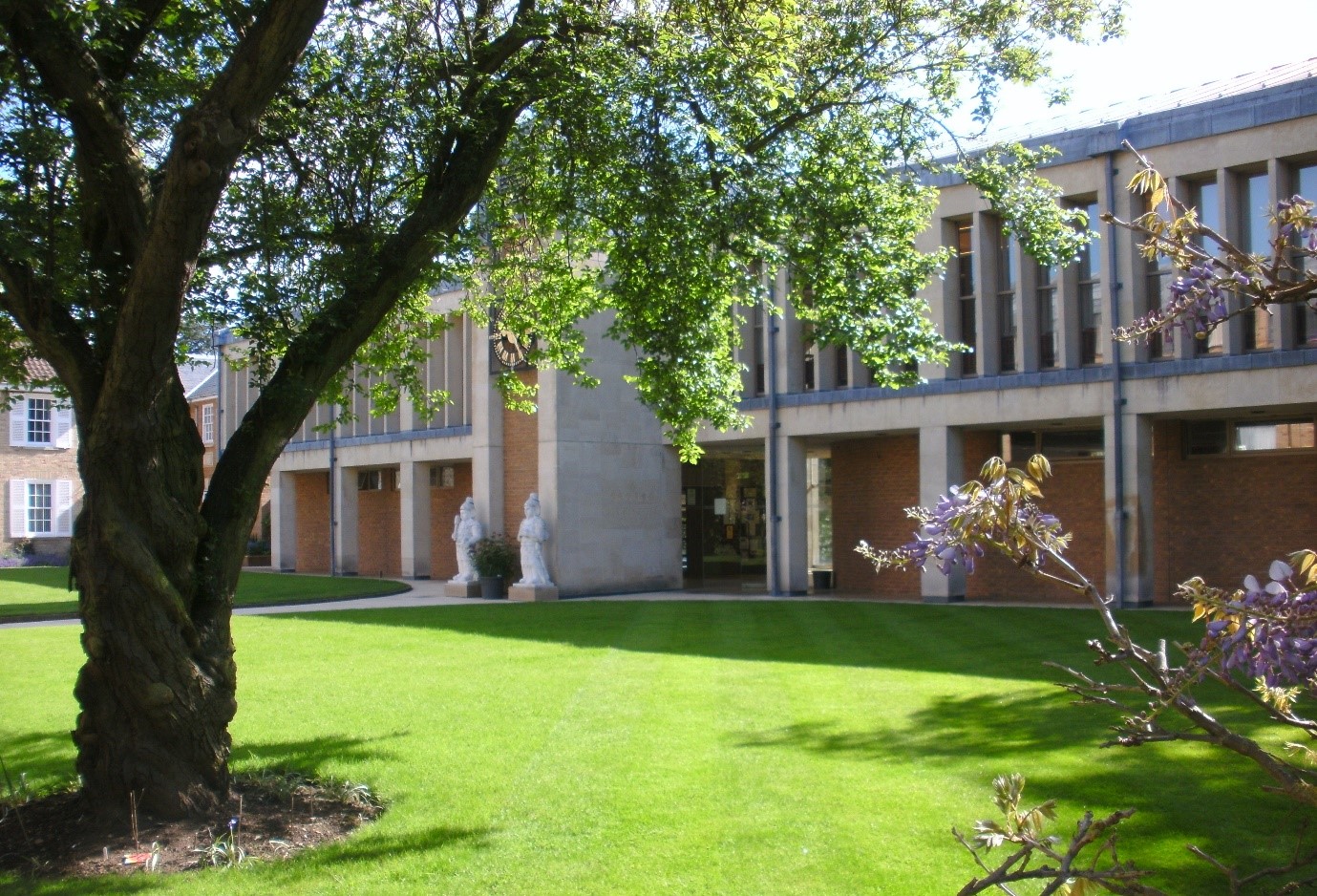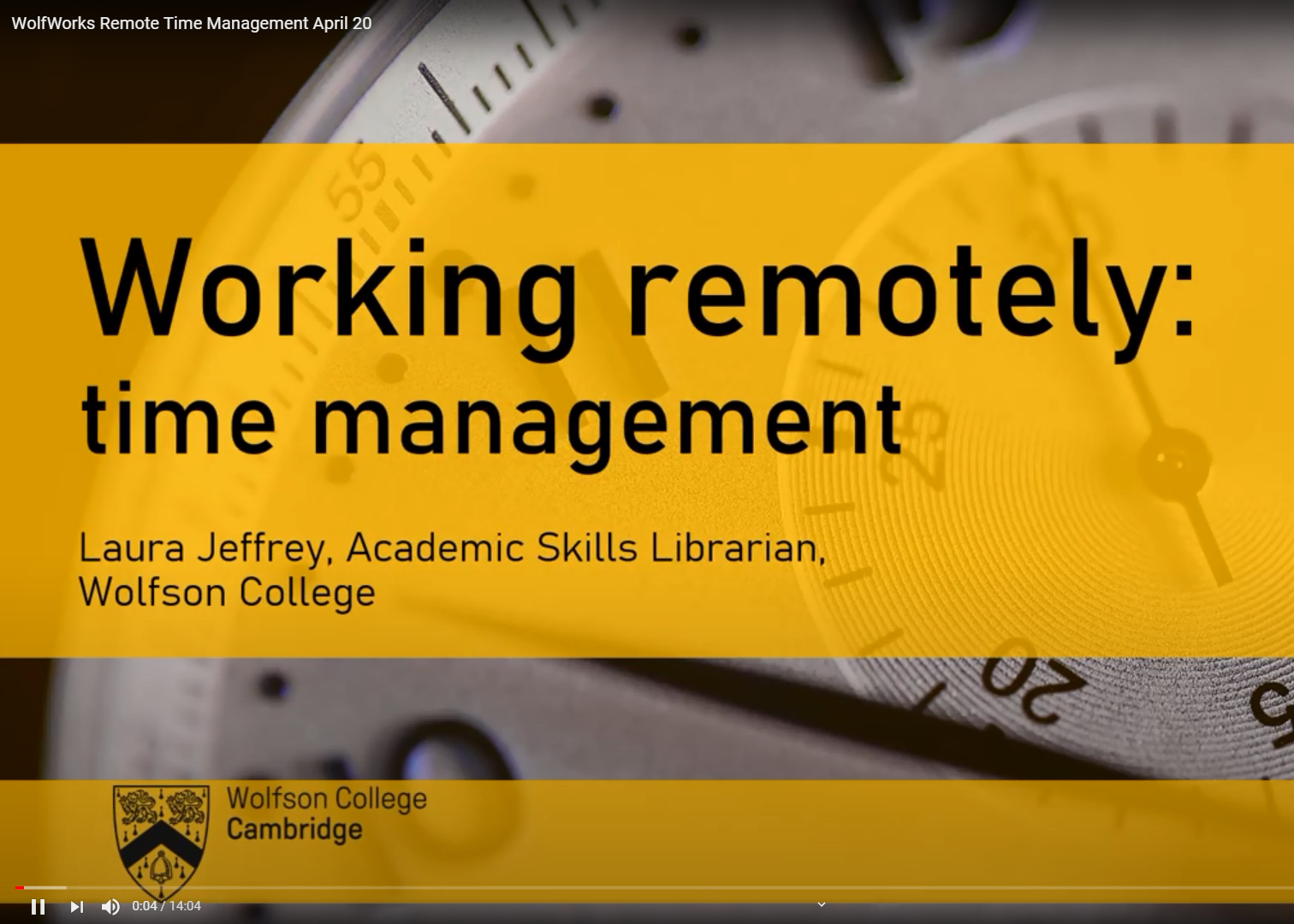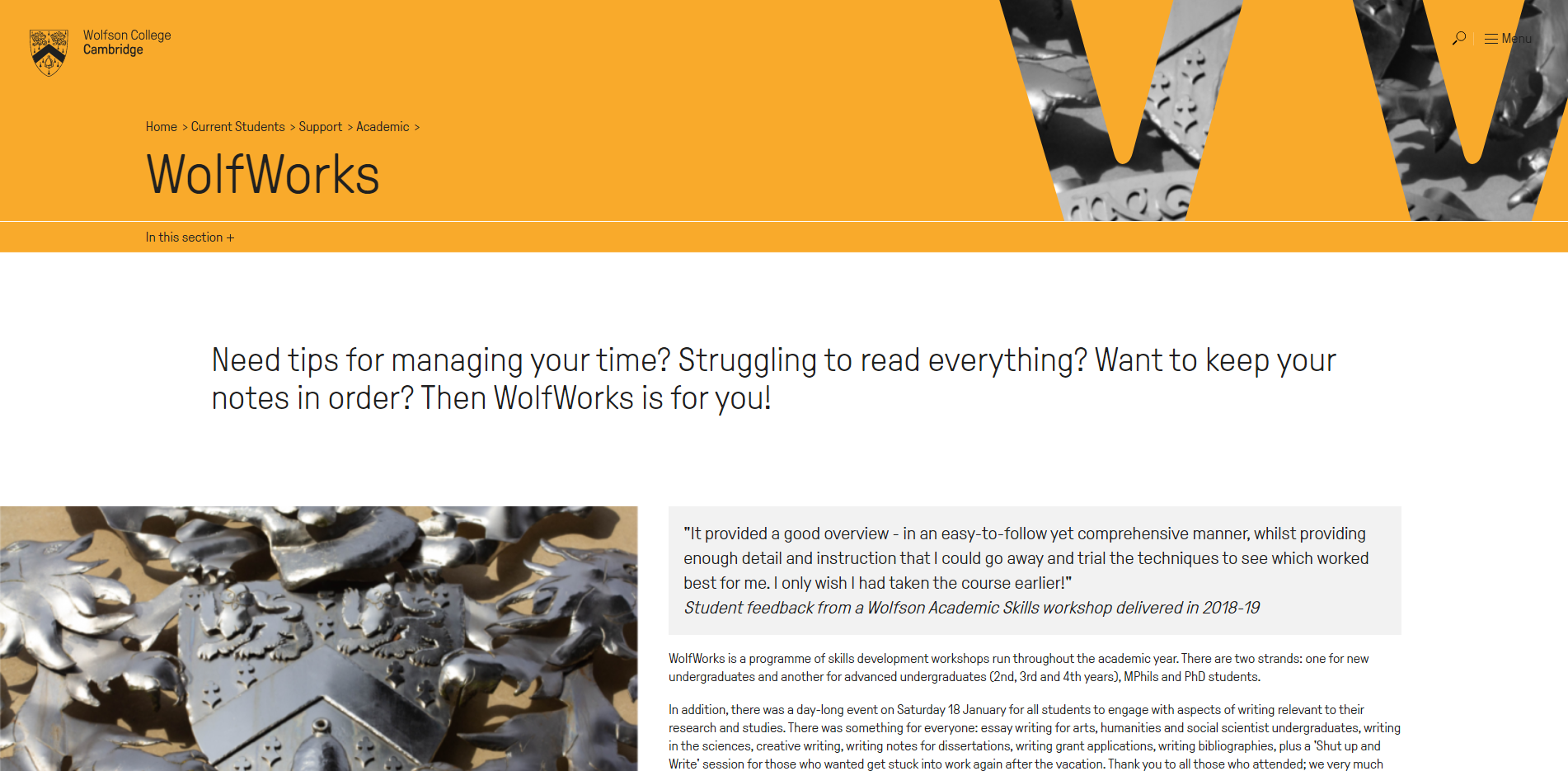Spotlight: "Remote Library" at Wolfson
Providing a remote service at Wolfson College Library
With the closure of physical library buildings, it is easy to imagine that libraries the world over are in stasis as they await the return of students and researchers. However, libraries have always been in the business of supporting studying and writing, and not merely about physical books and reading rooms. While students right now may not require our standing desks, lumbar supports, book rests and blankets (in addition to the usual tables and chairs), they do need access to e-resources and academic skills development as they adapt to novel ways of working.

At the Wolfson Library, we have always been keen to connect with our students. In the physical space we seek to engender a sense of belonging with a range of academic skills classes, and wellbeing activities such as crafts, jigsaws and tea breaks. Maintaining community at a distance, however, can be hard for students learning online at the best of times (Berry, 2019), and so now more than ever we have sought to reach out and demonstrate our availability. As students can no longer pop their heads round the door, we are holding "office hours" on Microsoft Teams every afternoon. In addition to answering students' emails in the usual way, we have implemented a new form for in-depth academic skills queries, and are offering screencasts, step-by-step PDFs or online calls by way of response. Encouragingly, one student commented recently that while he hadn't visited the library pre-COVID-19, just knowing that it was continuing to function as an online support centre gave him motivation.
We have also increased the frequency of our library newsletter, Off The Shelf, as a reminder of what the library can offer. Issues contain updates on the vast array of new e-resources that have been opened up for the COVID-19 period, information about the status of print resources students and researchers may still have in their possession, all our new services, and tips for wellbeing. Our Twitter account is also updated daily, and all new services are signposted from our new web page, "Using the Library at a Distance".

Several years ago, Wolfson was the first College library at Cambridge to create a "LibGuide". These online guides are used primarily by faculty and departmental libraries for showcasing resources and facilities. Ours, however, focuses entirely on academic skills, from planning a literature review and managing references to note-making and beating digital distractions. One of our first responses to the closure of the University was to create a whole new section on Working Remotely, to help students adapt to alternative ways of studying and researching under lockdown. It is based on a similar guide, created by the University of Hull library within days of the lockdown commencing and made freely available for adaptation to local contexts. The Wolfson version contains similar messages for students, such as advice on listening to recorded lectures, taking part in webinars and working collaboratively at a distance. In addition, it aims to provide reassurance that new technologies can be frustrating and that students may need to invest time in becoming comfortable using them. Finally, it contains traditional library advice on accessing e-resources while off-campus.
In addition to this new resource, we have taken the college's entire formal academic skills programme, WolfWorks, online. Launched in October 2019, WolfWorks gave a fresh look and revised structure to an existing set of workshops (Academic Skills for Success) aimed at developing the academic, personal and career skills of its students. Run by Meg Westbury and Laura Jeffrey of the College library and overseen by Senior Tutor Susan Larsen, workshops are facilitated by the organisers, college tutors, college counsellor, fellows and an external study skills tutor. Over the past two terms, hour-long workshops were run on Wednesday and Thursday evenings, and there were periodic day-long events such as a series on writing skills.
The programme is inspired chiefly by Murray Edward's Gateway Programme, which has been operating successfully for over ten years. A distinctive element of WolfWorks is that it echoes the Gateway Programme decision to split training between first-year undergraduates and other students. WolfWorks for New Undergraduates created a separate space and appropriate content for incoming students, informed by an extensive skills survey we conducted in 2019 which highlighted their desire to focus on developing academic practices such as critical evaluation, reading strategies, note-making, memory skills for revision, and dealing with feedback. WolfWorks Plus was then a separate programme for all other students, covering topics such as literature-searching, reference management, presentation skills, job applications, and publishing.

WolfWorks was designed to be responsive to our students' needs, so taking it online seemed like a natural step. This Easter Term, rather than "transition-to-university" acting as the focus of our resources, we are turning our attention to the transition to working remotely. In place of face-to-face workshops, we're delivering short videos and guides asynchronously. However, we feel it is important not to rely solely on text-based communication for distance learning (Lowenthal et al. 2017) and so are also giving students and researchers the chance to drop in to an online meeting a week later, to discuss the topic, share experiences or ask questions. Sessions will include time management and digital wellbeing, with content later in the term supporting students and researchers finishing dissertations and theses, including editing long documents and stress-free referencing.
We're developing our support for academic writing outside of the WolfWorks framework too - Meg is holding online 1-2-1 writing tutorials and virtual shut-up-and-write sessions to encourage community and writing productivity, both of which have proven extremely popular. In addition, we're facilitating online peer-support writing groups for postgraduate students, to help connect those working in similar subjects across time zones.
To conclude, during the COVID-19 crisis the Wolfson Library is seeking ways to respond to students' new contexts and modes of working, thus reinventing what it means to be a library, in a virtual environment. Our offering for remote working has expanded significantly in the past few weeks, but we expect that, when life eventually goes back to "normal", many of our new online materials and services will live on to better serve our students. We hope to continue much of what we have established when we finally return to our physical space and face-to-face services and support.
Authors

Laura Jeffrey is Academic Skills Librarian at Wolfson College.

Meg Westbury is the Librarian for Wolfson College, and a PhD candidate in Technology-Enhanced Learning (Lancaster University).
References
Berry, S. (2019) Teaching to Connect: Community-Building Strategies for the Virtual Classroom. Online Learning, 23(1) p164-183. Accessed: 27 April 2020. doi: 10.24059/olj.v23i1.1425
Lowenthal, P., Dunlap, J. & Snelson, C. (2017) Live Synchronous Web Meetings in Asynchronous Online Courses: Reconceptualizing Virtual Office Hours. Online Learning, 24(4). Accessed: 27 April 2020. doi: 10.24059/olj.v21i4.1285
Cambridge Teaching & Learning Newsletter vol. 1 (issue 4) April 2020
